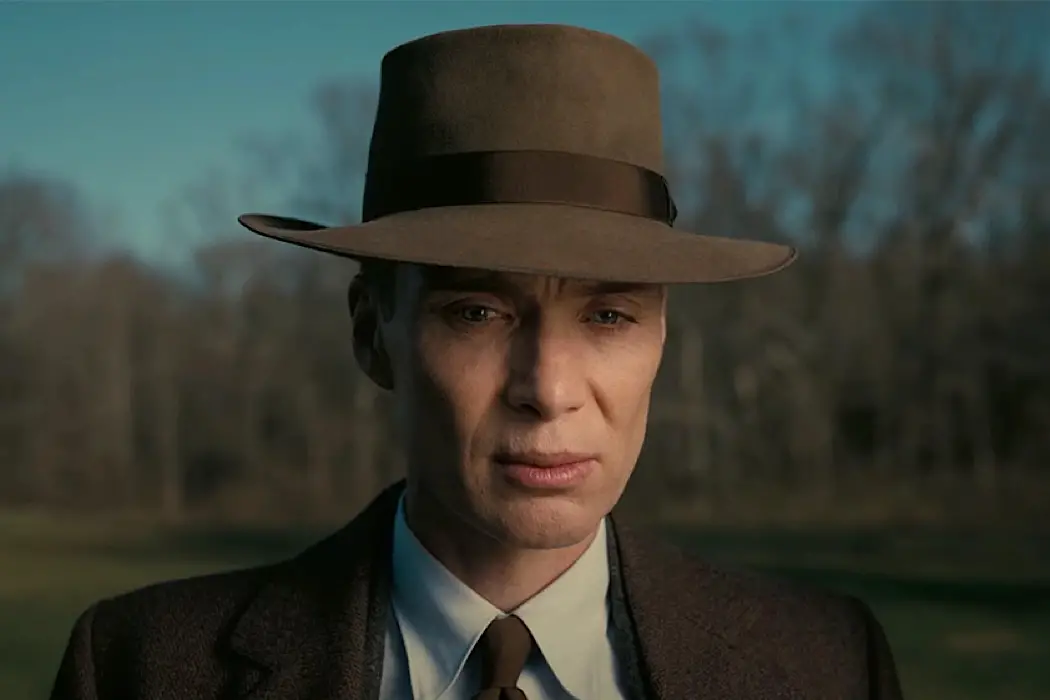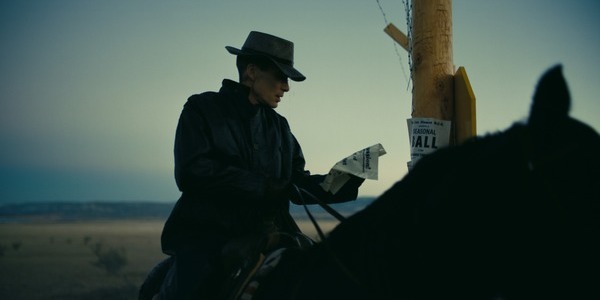OPPENHEIMER: The Horror, The Horror

Payton McCarty-Simas is a freelance writer and artist based in…
“I will show you fear in a handful of dust.”
This line from T.S. Eliot‘s triumph of modernist poetry, The Waste Land, encapsulates Christopher Nolan‘s granular approach to the life of J. Robert Oppenheimer, “the father of the atomic bomb,” who reads the poem in his university days, haunted by visions of atoms and stardust, too tortured to sleep. Oppenheimer, based on Kai Bird and Martin J. Sherwin‘s biography American Prometheus: The Triumph and Tragedy of J. Robert Oppenheimer, is an existentialist portrait of a man caught between his own petty humanity and his ability to peer into the very fabric of the universe and understand it. Over the course of three hours, Oppie (as his colleagues call him) finds himself both master of, and subject to, the principles of quantum physics, straining to reconcile the vast matrices of war and politics with his own almost obstinate naivete and blind loyalty to his own impulses. “Strong attractions,” as he tells his wife-to-be at a party when she asks him to explain his field of study.
Fission
At its best, Oppenheimer is a character study that uses its protagonist to atomize the worldly implications of the distinction between theory and practice, between humanity and life as a human being, and Oppenheimer is the perfect vessel for the task. Embodied by Cillian Murphy, this complex figure is explored as more than just a part of history, but as a man, torn asunder by what Nolan rightly calls “impossible ethical dilemmas.”

Oppenheimer‘s life is a mess of contradictions: As an adult, he went from the living rooms of the Leftist academic intelligentsia, to Los Alamos where he headed the top-secret Manhattan Project developing the A-bomb, and finally to a life of public activism against nuclear proliferation, a phenomenon he himself set into motion. This last also led to his systematic, underhanded discrediting by the United States–– a smear campaign that he did little to fight. Whether he likes it or not, as his Berkeley colleague, the eventual Nobel Prize Winner Ernest Lawrence (Josh Hartnett) frustratedly tells him, Oppenheimer isn’t “just self-important, [he’s] actually important.”
The narrative of Oppenheimer‘s life certainly holds more than ample fascination for even a film with a three-hour runtime, and the story is treated comprehensively, with care and depth. Yet Nolan‘s film fixates on the strange character of the man himself, presenting him as an impossible force and an immovable object, at odds with his own temperament. He can’t help but set himself up for failure at every turn: He is impulsive and egotistical, injecting cyanide into his professors’ apples (but snatching them away before they can be eaten), sleeping with other men’s wives (but always with flowers in hand), and ignoring his colleagues open warnings that his association with “known Communists” will pose a danger to his career (while actively refusing to join the Communist Party). He eagerly builds a weapon of mass destruction, yet crusades against new such devices soon thereafter.
Fusion
Nolan‘s directorial choices skillfully animate the deep psychological drama of his subject matter throughout. Murphy‘s performance is masterful, his weathered, skeletal face reflecting his character’s unpredictability with the grace of the clouds that cross the New Mexico sky. The arresting 65mm IMAX cinematography by Hoyte van Hoytema captures this same duality, contrasting the washed-out tones of a midcentury photograph with the high-contrast monochrome of a Sidney Lumet or Otto Preminger film.

Both modes feel lived-in, particularly the black and white, which manages to avoid the sensation of homage to an earlier period in (film) history, balancing classicism with freshness. Nolan’s script, though hampered by occasionally overwrought dialogue, is largely well-structured to weave past and present into a sinewed tapestry that evokes the occasionally jagged flow of memory, even as time moves inexorably forward without us.
Like his protagonist, Nolan does occasionally lose himself in the more quotidian concerns of his personal project. His penchant for casting well-known actors sometimes proves distracting, most notably (for me) with the choice of former Drake and Josh star Josh Peck, whose virtually wordless performance is undeniably comic: he appears largely out of focus or half-glimpsed in the background. Other familiar faces fare better, Matt Damon brings warmth and bravado to his role as Lt. General Leslie Groves, the military director of the Manhattan Project, and Robert Downey Jr.‘s Atomic Energy Commission chairman Lewis Strauss is suitably mendacious, but as the list grows longer and more inexplicable–– Tony Goldwyn, Alex Wolff, Gary Oldman, Rami Malek, and so on, and so on–– there are only diminishing returns to be found.

The film’s few women (almost all Oppenheimer‘s lovers) are also given tragically little to do, though Emily Blunt and (particularly) Florence Pugh nevertheless manage to animate their textually thin characters beautifully. The film’s final hour, structured slightly more traditionally as a political procedural, drags relative to the rest of its runtime.
Conclusion
Still, the film’s poetic treatment of its subject overcomes these foibles to create something profound, expanding on themes Nolan began to explore in The Prestige, with David Bowie as Nicola Tesla: “You may live to see man-made horrors beyond your comprehension,” and, sometimes, you may be the one to create them. The film’s atemporal journey through Oppenheimer‘s subjectivity, from his petty arrogance to his martyred brilliance, is punctuated with dreamy flashes of surrealism–– psychedelic sojourns into atomic structure, strange premonitions of events to come, and even dazzling moments of pure hallucination ranging from erotic to nightmarish. His psyche inflects everything, down to the dust motes in the air at Los Alamos, whose delicate shadows ripple around him like the terrifying messengers of a nuclear apocalypse he’s envisioned since his university days reading The Waste Land.
Another, more gruesome kind of dust swirls when he imagines the literal fallout of his creation, his foot crunching through the incinerated chest cavity of a colleague on the floor, a horrifying exercise in semi-sculptural transfiguration. Oppenheimer‘s matter-altering creation exists at the violent, perverse center of politics, science, and, in this film, modern art.
Oppenheimer was released in theaters on July 21st, 2023.
Watch Oppenheimer
Does content like this matter to you?
Become a Member and support film journalism. Unlock access to all of Film Inquiry`s great articles. Join a community of like-minded readers who are passionate about cinema - get access to our private members Network, give back to independent filmmakers, and more.
Payton McCarty-Simas is a freelance writer and artist based in New York City. They grew up in Massachusetts devouring Stephen King novels, Edgar Allan Poe stories, and Scooby Doo on VHS. Payton holds a masters degree in film and media studies from Columbia University and her work focuses on horror film, psychedelia, and the occult in particular. Their first book, One Step Short of Crazy: National Treasure and the Landscape of American Conspiracy Culture, is due for release in November.













